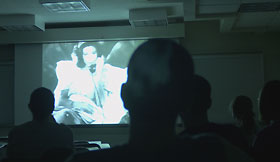|
This is an archived article.
For the latest news, go to the Advance Homepage
For more archives, go to the Advance Archive/Search Page. |
||
|
Film Studies Minor Enhances
One night it might be Howard Hawks's Scarface. Another night it might be Stanley Kubrick's Spartacus, or Fritz Lang's Metropolis. These are some of the works students will see as part of the new film studies minor, offered for the first time last fall. An interdepartmental and interdisciplinary course of study, the minor is offered through the Department of Modern and Classical Languages.
The program, requiring 18 credits of course work, brings together a broad range of courses that will acquaint students with a variety of perspectives on film and enhance their critical appreciation of film culture in social and historical contexts, says Norma Bouchard, associate professor of modern and classical languages. "We wanted students to have a good introduction to world cinema and comparative film theory, and those are part of the core courses," she says. Core courses also include two newly created ones - Studies in Film History and Film Genres. In addition, the film minor will include courses taught in drama, communication sciences, English, women's studies, political science, Latin American studies, sociology, and Puerto Rican and Latino studies. "It's a collaborative effort," says Bouchard. Students are also required to take classes in national cinema, which include German, French, Italian, Spanish, and Classics, taught either in English or the native language, as well as interdisciplinary courses such as political propaganda and film, and women in film. In a typical course, students will see 14 films. The screenings, which take place in the Arjona building in the evening, are open to the public. Bouchard says the study of film has become an increasingly important part of academic disciplines: "Film has become a literary text. For instance, if you're studying the culture of Fascist Italy during the 1930's, film is fundamental to understanding what was going on in terms of propaganda - probably much more than the novel. The same can be said for other areas of study." The study of film complements students' other academic courses, and gives them a broader understanding of culture and society, faculty say. "Film is the hegemonic narrative form of our time," says Roger Travis, associate professor of classics, "and it now has a long enough history that we can study it both diachronically, through time, and synchronically, as a set of works of art that stand outside time. Everyone knows that movies are important to our society, but in my experience, very few students understand just how deeply their entire world views are shaped by what they've seen in the cinema and on TV." Ed Benson, professor of French in residence, says study of film is important because "it brings together disciplines and areas of study that are not routinely associated, like cultural history and critical theory. Students sometimes fail to relate what they are studying in one course with other courses they are taking, even in the same semester. This will encourage them to lift their sights." |

